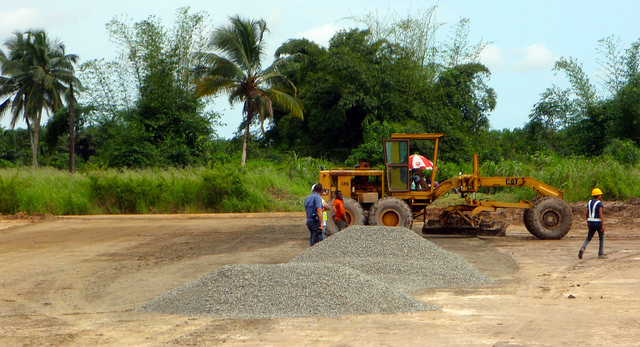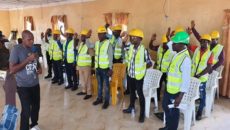Since independence in 1847, all major political and economic decisions about the running of the country have been taken by few national leaders in Monrovia. This practice meant that a huge portion of the country did not have a significant voice in the way their country was being run.
In Liberia, the over-centralization of political, economic and fiscal governance in Monrovia resulted over the years in gross underdevelopment in interior counties. This did not go unnoticed by the new Ellen Johnson Sirleaf government upon ascending to power.
The government understood at the time that Liberians were now more interested in economic rights over public resources than the political rights that were rigorously demanded in the 1970s and 1980s.
The government immediately began devising ways to transfer some of decision-making authority to local communities through a systematic agenda for decentralization of national governance. In an attempt to address the situation, the new government established the County Development Fund.
The amount of US$200,000 has been allocated to each of Liberia’s 15 counties annually in the national budget. The total amount appropriated in the budget for the CDF is US$3,000,000. Several counties also received Social Development Funds from concession companies.
For example, the Mineral Development Agreement between ArcelorMittal and the Government of Liberia established a County Social Development Fund to be funded by an annual contribution of US$3 million provided by ArcelorMittal.
The British-Indian company ArcelorMittal is the world’s largest steel company and mines ores in Nimba. The beneficiaries of this fund are Nimba, which receive 50 percent, Grand Bassa with 33.3 percent, and Bong with 16.7 percent.
Social Development Funds are now combined with the CDF for accounting and management purposes. Each county maintains a CDF account in which the fund is deposited for official transfer to the counties.
The CDF is currently apportioned equally across all 15 counties of Liberia, regardless of the population, poverty level, economic development and other factors.
Unlike this flat-rate approach of allocation, Kenya’s Constituency Development Fund is divided throughout constituencies using a flat-rate for a certain percentage of the fund and considering population and poverty level for the remaining percentage.
This makes particular constituencies have amounts that are slightly higher and lower than others each year. In Liberia, the idea of releasing equal amounts to every county despite population, poverty level, economic viability, and level of self-development has been regarded by many as unfair. In bigger counties like Nimba, some citizens have been agitating for the division of the fund to receive additional development fund from the central government.
The CDF is presided over at the national level by a Dedicated Fund Committee. In the counties, the CDF is managed by the county administration and specifically by the Project Management Committee.
The PMC has three members that are officially elected at the County Council Sitting for a term of three years. A chairman heads the PMC, closely assisted by a treasurer and a controller. The PMC manages the financial and technical aspects of the CDF. They are charged with the responsibility of implementing the provisions of the resolutions from the County Council Sittings in various counties.
In districts where projects are earmarked, the citizens are required to form a Project Management Team to help coordinate the project on the ground. Decisions of the Special County Development Council taken at any sitting are expressed in the shape of a resolution.
Once the County Council has allocated funds to an area, it is the responsibility of the citizens of the targeted area to meet and appoint a PMT, which coordinates the planning of all activities relating to the projects for their area.
The members of the PMT include a chairperson who is responsible for overall coordination of the team, a treasurer who ensures that all money matters are handled properly, and a secretary who ensures that all communications and records of the team are prepared and kept in good order at all times.
Members of the PMT, in consultation with the PMC, are collectively responsible for the implementation of the area project. The PMT is the principal contact between all relevant and concerned entities in respect to the implementation of area projects funded with the CDF. The PMT reports to the citizens of their area.
Decisions about spending the CDF are squarely in the hands of the County Council. The council gathers annually and is comprised of citizens and stakeholders of the county who make major decisions concerning the management and use of the CDF for each fiscal year.
The Council Sitting is organized by the superintendent and the legislative caucus of each county. Delegates to the Council are required to be the most inclusive, comprising of representatives from most or all constituent groups and demographic components of the county.
This is intended to give popular support and credibility to the resolution from the County Council in the eyes of the citizens. In the absence of the County Council, the superintendent, the PMC, and the legislative caucus make critical decisions about the management and use of the CDF.
All withdrawals from a County Development Account require the authorization of the first principle, second principal, and a stead. A withdrawal authorized by a principal and a stead in the same category is not valid or legal.
Compliance is required for all CDF-related transactions with the Budget Law and the PPC Act.
For example, the 2013/2014 Budget Law mandates the PMC to ensure that transaction documents relating to the use of the CDF are in conformity and compliance with the Public Procurement and Concession Act and Budget Implementation Regulations.
Contrary to this, many payment vouchers do not obtain the required supporting documents before payments are made. The PPC Act, also calls for the safekeeping of all procurement-related documents for up to six years after the date of the transaction. Failure to safely keep major supporting documents for CDF procurement transactions is considered a breach of this provision.
The Public Procurement and Concession Commission Threshold Schedule mandates spenders of public funds, including the CDF, to publish contract award if the value is equal to or above US$20,000 for goods, US$10,000 for service, and US$30,000 for works. They are also required to use the National Open Competitive Bidding process when the value of the procurement is equal to or below US$500,000 for goods, US$ 200,000 for service, and US$ 1,000,000 for works.
The International Competitive Bidding is required to be used when the amount of the procurement is above the threshold for the National Open Competitive Bidding. The Ministry of Finance is expected participate in the negotiation and signing of contracts with values above US$250,000, and such contracts must be attested to by the Ministry of Justice.
Most of the time, auditors from the General Auditing Commission have discovered that the guidelines of the Public Financial Management and Public Procurement and Concession laws are violated by managers of the CDF, such as in the Auditor General Report on the Bong County Social Development Fund for April 1 to September 30, 2009.
In a subsequent article, I will detail some of the improvements that need to be made to the CDF procedures.
Featured photo:Â U.S. Army Africa/Lt. Col. David Doherty



